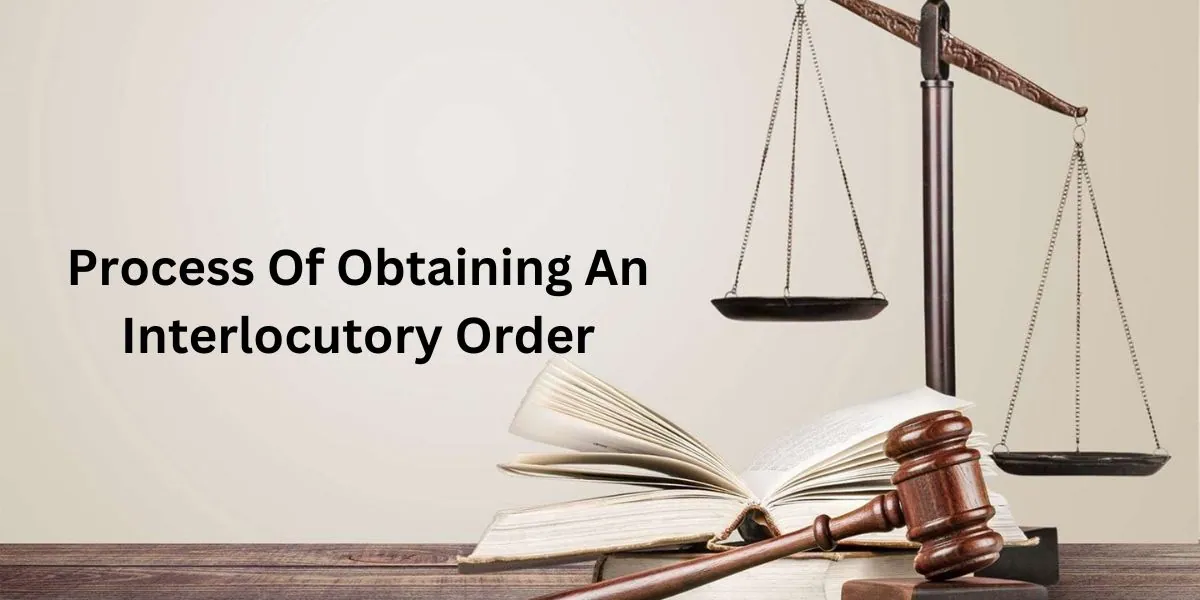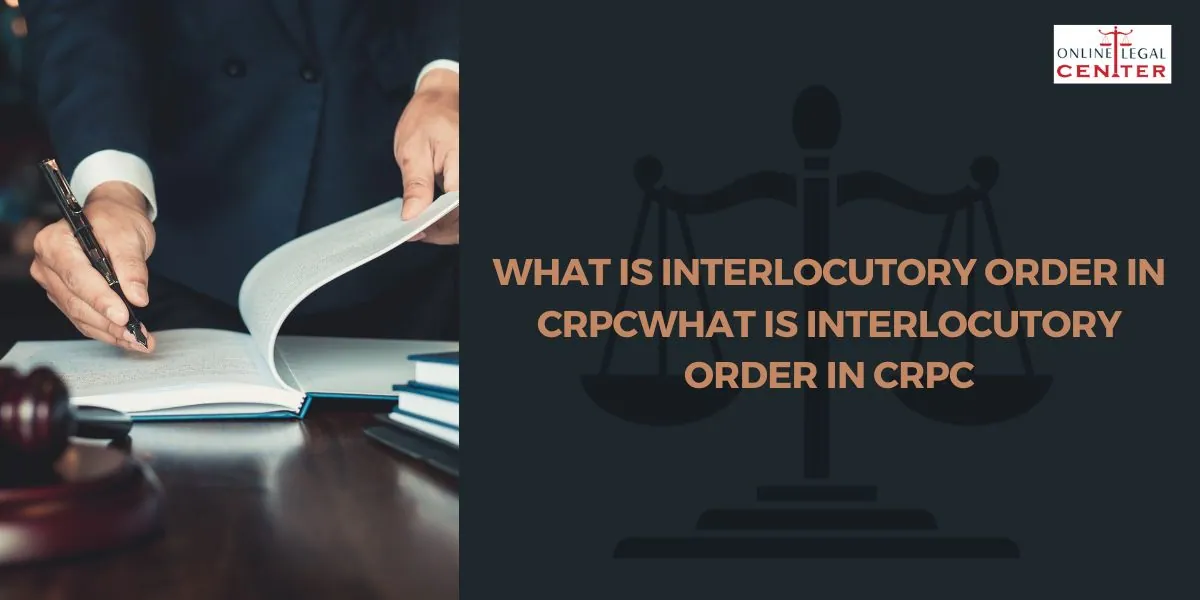What Is Interlocutory Order In Crpc: Interlocutory court orders within CRPC, as well as in the Code of Criminal Procedure, have a significant role to play in this Indian law system. These orders form an integral element of any legal proceeding and help to ensure an equilibrium between the needs of both parties. In this post, we’ll explore the different types of interlocutory order, their forms, their process for obtaining these, their importance, and many more.
Understanding Interlocutory Orders In CRPC
What Is An Interlocutory Order?
An interlocutory or interim order is a court decision that deals with specific questions during the length of a trial and is not an order of finality. They are used to protect the rights and the interests of all people involved and to ensure the legal process.
Importance Of Interlocutory Orders In CRPC

Interlocutory orders are essential for CRPC cases because they enable the judge to swiftly take action to stop unfairness, irreparable damage, or legal system abuse. They aid in maintaining a fair equilibrium between sides’ needs and encourage an efficient and fair legal process.
Legal Framework And Provisions
Interlocutory orders within CRPC are subject to the legal framework set out within the Code of Criminal Procedure. Various sections, including Section 438 (Anticipatory Bail) and Section 482 (Quashing of FIR), give the courts the authority to make interlocutory orders when required.
Essential Characteristics Of Interlocutory Orders
Interlocutory orders are characterized by their temporary nature since they do not constitute final rulings. They’re designed to offer interim relief or resolve specific concerns, like stopping the proceedings, making injunctions, or directing discovery.
Types of Interlocutory Orders
Preliminary Orders
Orders for preliminary hearings are given during the early stages of a matter to ensure the status quo and protect against imminent harm. These orders are crucial to protect the rights of all parties in the trial.
Also Read: What is a Complaint in CRPC
Temporary Injunctions
Temporary Injunctions are court-ordered orders that prevent a person from carrying out certain acts until the final judgment has been issued. The orders stop irreparable harm and keep the status of the law.
Stay Orders
Stop orders temporarily stop legal proceedings, ensuring no actions are initiated until further court or court orders. They’re often employed to stop the execution of specific decisions.
Discovery Orders
To satisfy discovery orders, parties must divulge specific documents or relevant information. This helps in obtaining evidence and ensuring transparency in the legal process.
Process Of Obtaining An Interlocutory Order

Filing An Application
For an order, interlocutory A party must submit an application to the court with a specific explanation of the relief sought. The relevant facts and evidence should support the application.
Court’s Discretion
The court has the authority to approve or deny interlocutory orders based on the facts of the case and the justice’s best interests.
Hearing And Arguments
A hearing occurs in which the parties argue their case while the judge considers the evidence and legal precedents. The court will then determine if it is appropriate to accept the ruling.
Granting Of Orders
If the court determines that an interlocutory order is needed to protect interested parties’ rights and interests and interests, it can grant the order subject to certain conditions.
Significance Of Interlocutory Orders
Preservation Of Rights
Interlocutory orders are crucial to protect all parties’ rights and interests in court and ensure they are only impacted once the final judgment is issued.
Avoiding Irreparable Harm
They are intended to prevent irreparable damage, which could result if certain acts are permitted to occur without being checked during the trial.
Expedited Proceedings
Interlocutory order helps speed up the legal process by dealing with specific issues on time, leading to an efficient justice system.
Balancing Of Interests
They balance the interests of all parties concerned, preventing the benefit of one side and putting another in harm’s way.
Interlocutory Orders, in contrast to. Final Orders
Although interlocutory orders are limited in duration and designed to address particular issues final o, orders are the last rulings that conclude the case. These orders significantly impact all parties concerned, whereas interlocutory orders are designed to keep the current status during the process.
Recent Landmark Cases
Illustrative Cases
Several landmark cases have helped shape how we understand and apply interlocutory decisions within CRPC. They set crucial precedents in law and leave an effect on the jurisprudence.
Impact On The Legal Landscape
The rulings in these cases influence legal procedures and the understanding of CRPC rules on interlocutory orders.
Challenges And Controversies
Abuses And Misuse
The interlocutory order is not invulnerable to misuse or abuse. There are instances when parties request orders to delay the process or gain unfair advantages.
Revisiting The Legal Framework
To resolve controversies and issues, There is a constant debate about re-examining and improving the legal basis for interlocutory court orders.
The Role OF Legal Counsel
Importance Of Competent Representation
The presence of a competent lawyer is vital in obtaining interlocutory court orders. Legal counsel plays a crucial function in bringing persuasive evidence to the judge.
Strategies For Obtaining Favorable Orders
A lawyer with experience can utilize different strategies to improve the chances of receiving an order favorable to interlocutory proceedings by presenting substantial evidence and convincing arguments.
Practical Implications For Litigants
The parties involved in the case are advised of the importance of interlocutory order and know how to manage the legal procedure efficiently.
Case Studies
Cases with real-world relevance involving interlocutory orders illustrate these orders’ impact on the legal process. Let’s examine a few examples to understand the real-world implications of interlocutory court orders.
Case Study 1: XYZ Corporation Vs. ABC Enterprises
In this case, XYZ Corporation requested a temporary order against ABC Enterprises to prevent the firm from releasing the product, which was believed to infringe the intellectual property rights of XYZ. A court handed down the interim injunction and prohibited ABC Enterprises from releasing the product until a final decision is reached. This instance illustrates how interlocutory judgments are a way to protect an individual’s intellectual property rights in the course of legal proceedings.
Case Study 2: Land Dispute In Smithville
The land dispute in Smithville was a battle between two parties claiming ownership over the land in question. To stop either party from developing or selling the ground during the litigation, The judge issued a stay of proceedings that halted all activity concerning the property. This interlocutory order allowed the court to preserve its status quo as the litigation progressed. It also ensured no one gained any unfair advantage.
Interlocutory Orders In Other Jurisdictions
The idea of an interlocutory order is wider than CRPC within India. All jurisdictions recognize the value of interim relief to maintain the fairness of justice. Learning how interlocutory order functions within different legal systems may help improve the legal process and guarantee the right to legal proceedings.
Current Trends And Developments
The legal environment is constantly altering and is influenced by changes in social norms, technological advances, and global dynamics. Recent developments indicate an increase in the use of technology in legal instances, which will make the use and enforcement of interlocutory court orders more accessible and efficient.
Ensuring Compliance
To successfully implement interlocutory orders, the parties need to adhere to rules of procedure and legal requirements. It is essential to follow these guidelines to ensure that orders are granted and effectively enforced.
Interlocutory Orders And Access To Justice
Access to justice for all is an essential purpose for the law system. An interlocutory order is an instrument to make justice more accessible by dealing with urgent issues quickly. They play a crucial role in protecting fairness and the rights of people and organizations involved in legal disputes.
FAQs
What Is The Key Difference Between Interlocutory Orders And Final Orders In CRPC?
Interlocutory orders are short-term and deal with specific matters in legal proceedings. On the other hand, final orders are definitive judgments that end the trial.
How Can Parties Ensure Compliance With Interlocutory Orders?
Parties must adhere to the procedures and laws to ensure they comply with the interlocutory rulings.
Can Interlocutory Orders Be Misused Or Abused?
There have been instances where interlocutory orders have been used to delay procedures or obtain an unfair advantage. But, there are still talks about re-examining and enhancing the legal framework to address the concerns.
What Is The Role Of Legal Counsel In Obtaining Interlocutory Orders?
A competent legal representative is essential for requesting interlocutory orders. Legal counsel may employ a variety of techniques to boost the probability of getting favorable decisions.
How Do Interlocutory Orders Promote Access To Justice?
Interlocutory orders deal with urgent matters swiftly, thereby making justice easily accessible and also ensuring justice that is fair in court.
Conclusion
In the final analysis, interlocutory order within CRPC constitutes an essential part of the Indian legal system. They are used to safeguard the rights and interests of those in court, to prevent irreparable harm, and to help ensure the effective working of the justice system. Understanding the various types, procedures, and the significance of interlocutory court orders is crucial for legal professionals and those involved in legal disputes.
It could be a temporary or a permanent injunction for the protection of intellectual property rights or a stay order that helps to keep the current status quo of an estate dispute; interlocutory orders are crucial in the outcome of legal disputes. Litigants must navigate the legal system successfully and find qualified legal advice to improve their chances of getting favorably drafted interlocutory judgments.
Related Post:
How Many Sections Are There in CrPC
When Police May Arrest Without Warrant Under Crpc
Can Husband Claim Maintenance from Wife under 125 CrPC





